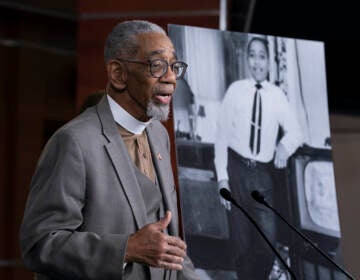Delaware AG gives guidance on hate speech after KKK fliers found
Denn also sent the guidelines out in 2016 after a national rise in hate crime reporting. In 2017, Delaware prosecuted six cases that included a hate crime charge.

KKK recruitment fliers were recently found in parts of southern Delaware. (Courtesy the Harrington Police Department)
After Ku Klux Klan recruitment fliers were reportedly found in parts of southern Delaware, state Attorney General Matt Denn, has reissued guidelines to police and schools detailing how to address hateful threats.
Denn said he wants to ensure law enforcement and school authorities take the necessary and appropriate steps to address hate speech.
“There’s obviously a concern raised when you see a group dedicated to hate and prejudice become active in the area, and certainly we were concerned what might follow from that,” he said. “And with respect to schools, schools have a lot of tools at their disposal in terms of what can and cannot be said in school and even on social media by students.”
“So given this type of activity was starting to happen we wanted to make sure it could be headed off at the pass whenever the law allows,” said Denn.
Police have been investigating the distribution of dozens of KKK recruitment fliers in Seaford and Harrington since Saturday. Various fliers call for whites to join the hate group, and include racially charged messages. Similar fliers also were discovered in other parts of the state and in Maryland.
Denn also sent the guidelines out in 2016 after a national rise in hate crimes were reported. In 2017, Delaware prosecuted six cases that included a hate crime charge.
The guidance for law enforcement explains the state’s hate crime statute allows for heightened penalties for other crimes motivated by bias, while the guidance for schools explains its authority to ban hateful speech in their facilities, as well as outside of school on social media if it is directed at students.
“I think there’s a lot of work that can be done at the school level in terms of proactively talking to students about things like inclusion and diversion and tolerance, not trying to rebut particular messages, but better educate students about those positive values,” Denn said. “My sense is our law enforcement organizations are attentive to this issue and are focused on it, so what we’re trying to do as attorneys is make sure they have the legal tools in their hands to be as aggressive as they like to be.”
No charges were filed in Seaford because, Denn said, Delaware law only criminalizes offensive speech if it’s targeted at a specific person or group. In that case, the KKK recruitment fliers were just posted publicly.
“Speaking in a way that’s offensive, and these messages were beyond offensive, that’s not something Delaware law allows to have criminally charged,” he said. “What we’re trying to do with this guidance is make sure they’re aware of all the different circumstances that could, in fact, result in criminal charges.”
WHYY is your source for fact-based, in-depth journalism and information. As a nonprofit organization, we rely on financial support from readers like you. Please give today.





